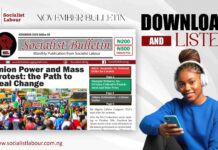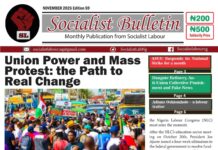By Jaye Gaskia
The raising of the national question and the agitation for restructuring is crafted by the ruling class primarily and solely in ethnic terms. Hence when they ask for restructuring, they are asking for ethnic restructuring; and when they talk about to regionalism, they are talking about ethnic regionalism. Thus, the agitation for restructuring is geared towards consolidating the ethnic federation which was crafted under colonialism and consolidated in an atomized manner by the military.
What has held the ethnic federation together is the presence of a strong and dominant hegemonic force; first represented by the colonial authority, and then much later by the military. As soon as the hegemonic force is removed or weakened, the ethnic federation begins to unravel, as we are currently seeing in Ethiopia, and as we saw in Yugoslavia and the in Nigeria of the first Republic.
In other ethnic federations like Ethiopia, the hegemonic center was held by the Tigrayan Peoples Liberation Force [TPFF] and its leadership of the Ethiopian Peoples Democratic Forces, which won the war against the Mengistu regime.
Apart from the huge salaries the politicians give themselves and their refusal to pay a decent minimum wage, there is nothing wrong with regions, states, provinces as basis of federalization. What is wrong is to posit and establish this on the basis of ethnic character. It excludes others and constrains the citizenship of the federation outside the ethnic base. This eventually will lead to disintegration because it consolidates the differences, rather than building on what unites citizens, which is the socio-economic character, the social and class questions.
Thus, in the recent words of comrade Jibo [Jibrin Ibrahim], it is important to emphasise that, “Ethnic Federations, by definition focus on ethno-linguistic differences alone and are usually held together by a hegemonic group that is able to lord it over the others. The hegemonic hold is difficult to sustain as differences, not similarities, become the sole object of focus and concern until the system cracks at the seams.’
From the foregoing it is clear that the national question as posed by the various fractions of the Nigerian ruling class is an ideological tool, deployed politically to divide the working class, enhance access of ethnic fractions to levers of control over ethnically partitioned state structure, and prevent a class challenge of the working classes to the power of the ruling class.
It is also clear that the restructuring that is required by the poor majority, is one that assures the redistribution of wealth, the democratization of the society, the democratic control of the state and ownership and management of the economy by the working people; thus enabling a radical social transformation and the emergence and building of a society based on social justice and social inclusion.
The response of the working classes, need to be posed clearly as a class response, and requires the opposition and ideological contrast of the Social Question to the National Question.
It is important to note that all of the major intrusions of the working masses unto the historical stage, from the anti- SAP Uprising of 1989, through the January Uprising of 2012, to the #EndSARS Youth Uprising of October 2020, have been accomplished by, and demonstrated the fighting unity of the oppressed, the common and universal citizenship of Nigerians from all nooks and crannies, and from all walks of life.
They underpin not only the social and economic character of the national question, they also point the way to the type of restructuring that is required – the redistribution of wealth and return of the commonwealth to the democratic ownership, control and management of the working masses.






